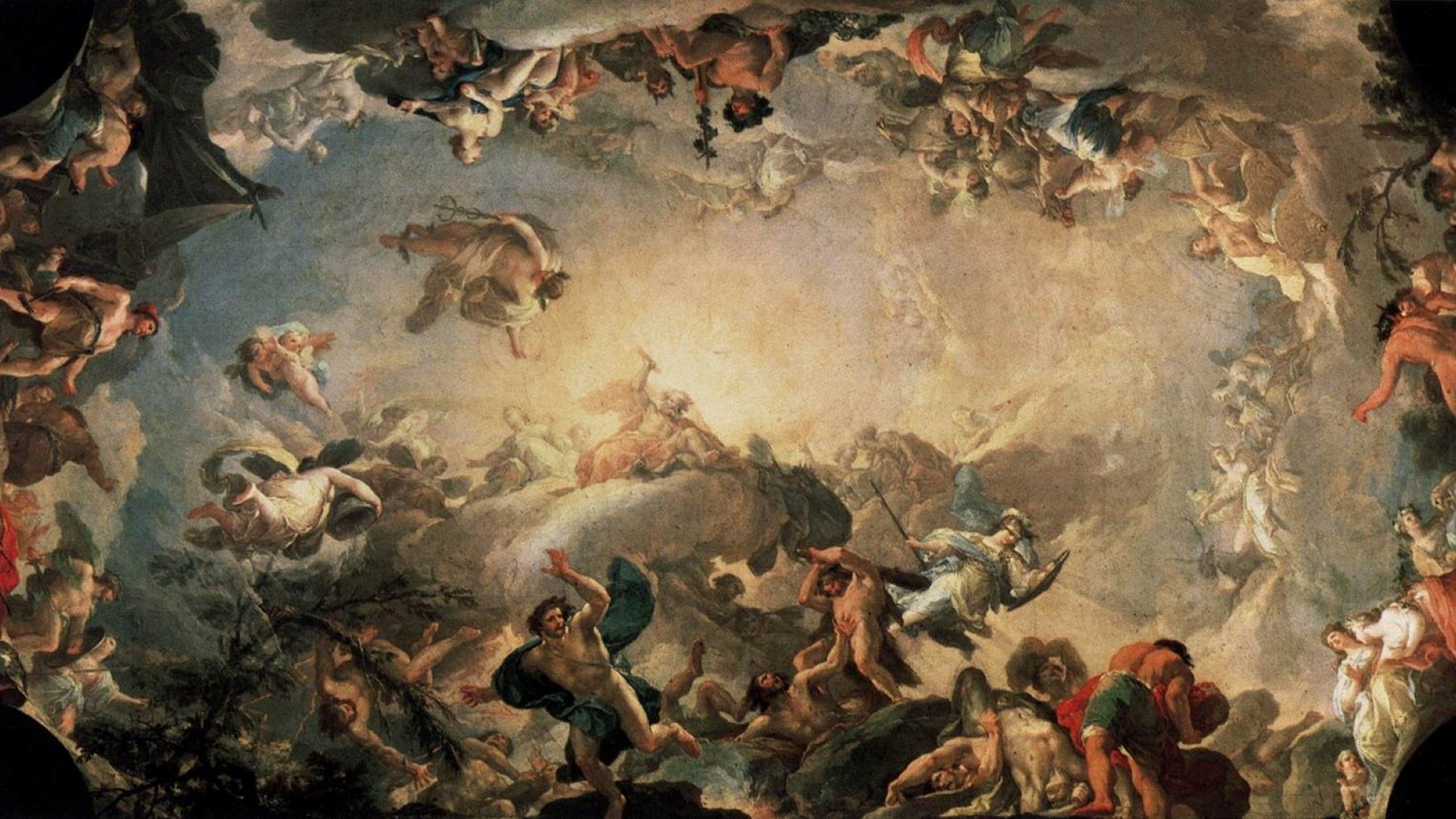
Colchian Dragon
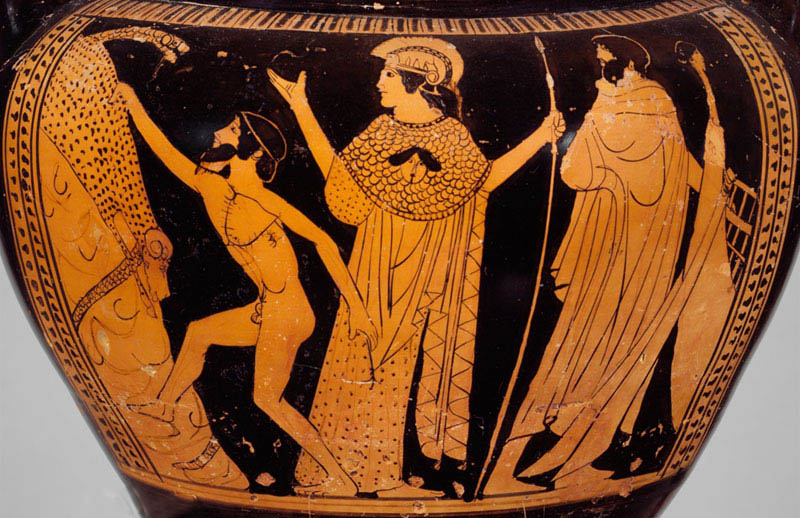
The Dragon that guarded the Golden Fleece
THE DRAKON KHOLKIKOS (Colchian Dragon) was a giant, watchful serpent which guarded the Golden Fleece in the sacred grove of Ares in Kolkhis (Colchis).
This immense serpent, a child of Typhon and Echidna, guarded the Golden Fleece at Colchis. It was said to never sleep, rest, or lower its vigilance. According to Ovid's Metamorphoses, the monster had a crest and three tongues. When Jason went to retrieve the Fleece, the witch Medea put the dragon to sleep with her magic and drugs, or perhaps Orpheus lulled it to sleep with his lyre. Afterwards, Medea herself had dragons pull her chariot.
When Jason and the Argonauts came to fetch the fleece, the beast was either slain by the hero or put to sleep by the witch Medea with her magic and drugs, or perhaps Orpheus lulled it to sleep with his lyre (Afterwards, Medea herself had dragons pull her chariot). In one version of the story -- preserved only in vase painting (see image below) -- Jason was first devoured and disgorged by the dragon.
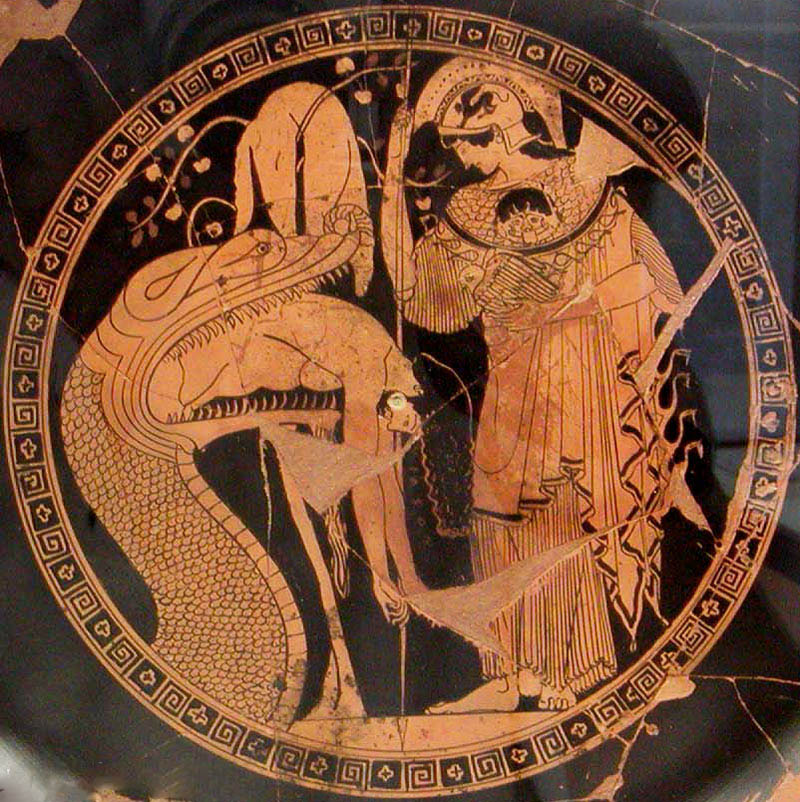
The monster's teeth were harvested by King Aeetes for their magical properties. He commanded Jason sow them in a sacred field of Ares with a plough drawn by fire-breathing bulls. When they were seeded a tribe of warlike men (Spartoi) sprang up full-grown from the earth. The teeth of the closely related Ismenian Drakon of Thebes, sown by Kadmos (Cadmus), produced a similar crop of men.
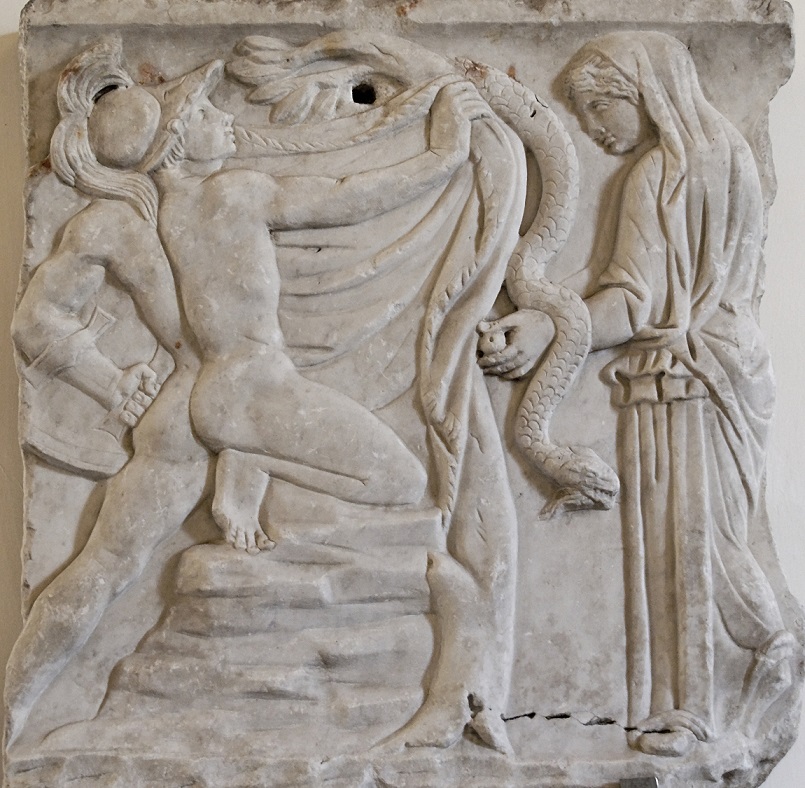
CLASSICAL LITERATURE QUOTES
JASON, THE DRAGON & THE GOLDEN FLEECE
Pseudo-Apollodorus, Bibliotheca 1. 109 (trans. Aldrich) (Greek mythographer C2nd A.D.) :
"The [golden] fleece, which was in Kolkhis (Colchis) in a grove of Ares, hanging from an oak tree, and guarded by an ever wakeful serpent."
Pseudo-Apollodorus, Bibliotheca 1. 132 :
"But Medeia (Medea) anticipated him by leading Iason (Jason) in the night to the fleece. She put the serpent guarding it to sleep with her drugs, took the fleece, and went with Iason to the Argo."
Pindar, Pythian Ode 4. 241 ff (trans. Conway) (Greek lyric C5th B.C.) :
"Straightway Aietes (Aeetes) spoke [to Iason (Jason) and the Argonauts] . . . and told where Phrixos' (Phrixus') knife had laid outstretched the shining fleece; yet in his heart he hoped that Iason (Jason) might even so this further labour fail to accomplish. For the fleece was laid in a deep thicket, held within the fierce jaws of a ravenous drakon (dragon-serpent), far surpassing in length and breadth a ship of fifty oars . . . he slew that drakon of the glaring eyes and speckled back."
Apollonius Rhodius, Argonautica 2. 1206 ff (trans. Rieu) (Greek epic C3rd B.C.) :
"[Argos, son of Phrixos, addresses the Argonauts :] ‘It would be no easy thing to take the fleece without permission of Aeetes, guarded as it is from every side by such a serpent, a deathless and unsleeping beast, offspring of Gaia (Gaea, Earth) herself. She brought him forth on the slopes of Kaukasos (Caucasus) by the rock of Typhaon [Typhoeus]. It was there, they say, that Typhaon, when he had offered violence to Zeus and been struck by his thunder-bolt, dropped warm blood from his head.’"
Apollonius Rhodius, Argonautica 2. 402 ff :
"The dark grove of Ares [at Kholkis (Colchis)], where the fleece is spread on top of an oak, watched over by a serpent, a formidable beast who peers all round and never, nigh or day, allows sweet sleep to conquer his unblinking eyes."
Apollonius Rhodius, Argonautica 2. 1267 ff :
"The plain of Ares and the god's sacred grove, where the snake kept watch and ward over the fleece, spread on the leafy branches of an oak."
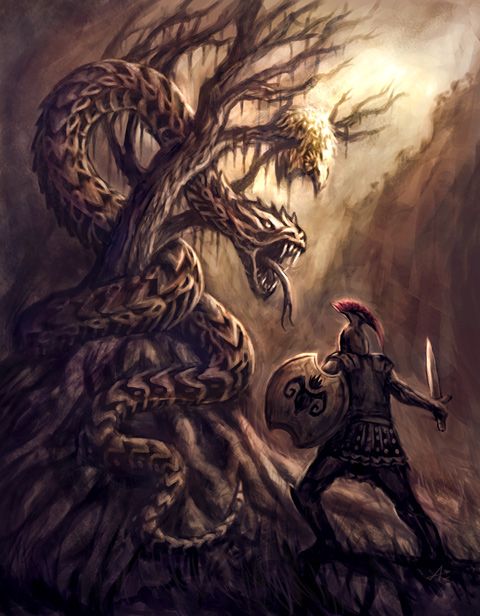
Apollonius Rhodius, Argonautica 4. 84 ff :
"[Medea addresses the Argonauts :] ‘I myself will give you the golden fleece, putting the guardian snake to sleep.’"
Apollonius Rhodius, Argonautica 4. 121 ff :
"A path led them [Iason (Jason) and Medea] to the sacred wood, where they were making for the huge oak on which the fleece was hung, bright as a cloud incarnadined by the fiery beams of the rising sun. But the serpent with his sharp unsleeping eyes had seen them coming and now confronted them, stretching out his long neck and hissing terribly. The high banks of the river and the deep recesses of the wood threw back the sound, and far away from Titanian Aea it reached the ears of Kholkians (Colchians) living by the outfall of Lykos (Lycus), the river that parts from the loud waters of Araxes to unite his sacred stream with that of Phasis and flow in company with him till both debouch into the Kaukasian (Caucasian) Sea. Babies sleeping in their mothers' arms were startled by the hiss, and their anxious mothers waking in alarm hugged them closer to their breasts.
The monster in the sheath of horny scales rolled forward his interminable coils, like the eddies of black smoke that spring from smouldering logs and chase each other from below in endless convolutions. But as he writhed he saw the maiden [Medea] take her stand, and heard her in her sweet voice invoking Hypnos (Sleep), the conquerer of the gods to charm him. She also called on the night-wandering Queen of the world below [Hekate (Hecate)] to countenance her efforts. Iason (Jason) from behind looked on in terror. But the giant snake, enchanted by her song was soon relaxing the whole length of his serrated spine and smoothing out his multitudinous undulations, like a dark and silent swell rolling across a sluggish sea. Yet his grim head still hovered over them and the cruel jaws threatened to snap them up. But Medea, chanting a spell, dipped a fresh sprig of juniper in her brew and sprinkled his eyes with her most potent drug; and as the all-pervading magic scent spread round his head, sleep fell on him. Stirring no more, he let his jaw sink to the ground, and his innumerable coils lay stretched out far behind, spanning the deep wood. Medea called to Iason and he snatched the golden fleece from the oak. But she herself stayed where she was, smearing the wild one's head with a magic salve, till Iason urged her to come back to the ship and she left the sombre grove of Ares."
Lycophron, Alexandra 631 ff (trans. Mair) (Greek poet C3rd B.C.) :
"He [Diomedes] shall have slain the Drakon (Dragon) that harried the Phaiakians (Phaeacians)." [I.e. The Drakon of Kolkhis (Colchis) had arrived in Phaiakia (Phaeacia) in its pursuit of the Argonauts and the stolen fleece.]
Lycophron, Alexandra 1308 ff :
"The fleece that was protected the watching Drakon's (Dragon's) ward. He [Iason (Jason)] came to Libyan Kytaia (Cytaea) [Kolkhis (Colchis)] and put to sleep with simples that four-nostrilled snake, and handled the curved plough of the fire-breathing bulls."
Diodorus Siculus, Library of History 4. 83. 3 (trans. Oldfather) (Greek historian C1st B.C.) :
"Medea assisting the Argonauts, slew with poisons the Drakon (Dragon) which, according to the myths, never slept as it lay coiled about the fleece in the precinct, and made her way with Jason down to the sea."
Diodorus Siculus, Library of History 4. 47. 3 :
"[A rationalisation of the myth :] He [Aeetes] also threw a wall about the precinct [where the Golden Fleece was kept] and stationed there many guardians, these being men of the Tauric Chersonese, and it is because of these guards that the Greeks invented monstrous myths. For instance, the report was spread abroad that there were fire-breathing Tauroi (Bulls) round about the precinct and that a sleepless Drakon (Dragon) guarded the fleece, the identity of the names having led to the transfer from the men who were Taurians to the cattle because of their strength and the cruelty shown in the murder of strangers having been made into the myth of the bulls breathing fire; and similarly the name of the guardian who watched over the sacred precinct, which was Drakon, has been transferred by the poets to the monstrous and fear-inspiring beast, the drakon."
Philostratus the Elder, Imagines 2. 15 (trans. Fairbanks) (Greek rhetorician C3rd A.D.) :
"The purpose of the voyage [of the Argonauts] was as follows : In Kolkhis (Colchis) is preserved a golden fleece, the fleece of the ancient ram that ferried Helle with Phrixos (Phrixus) across the sky, as the story goes. Iason (Jason), my boy, undertakes the task of securing this fleece--a task indeed, for to guard the fleece a drakon of fear-inspiring look and disdainful of sleep holds it encircled in his coils."
Philostratus the Elder, Imagines 2. 17. 6 :
"This creature [the Drakon (Dragon)] is said to be devoted to gold and whatever golden thing it sees it loves and cherishes; thus the fleece in Kolkhis (Colchis), and the apples of the Hesperides, since they seemed to be of gold, two drakones (dragon-serpents) that never slept guarded and claimed as their own."
Philostratus the Younger, Imagines 11 (trans. Fairbanks) (Greek rhetorician C3rd A.D.) :
"[From a description of an ancient Greek painting :] The ship [Argo], which forces its way along the river with much splashing of the oars, a maiden [Medeia] yonder at the stern who stands near a man in armour . . . and the drakon (dragon-serpent) which sprawls over the sacred oak tree over here with many a coil and bows to the earth its head all heavy with sleep . . . For after the contest with the bulls Mediea has charmed this drakon (dragon-serpent) to sleep, the ‘ram's fleece of golden wool’ has been seized as booty, and the crew of the Argo have now set forth in hasty flight, inasmuch as the maiden's deeds have become known to the Kolkhians (Colchians) and Aietes (Aeetes)."
Pseudo-Hyginus, Preface (trans. Grant) (Roman mythographer C2nd A.D.) :
"From Typhon and Echidna [was born] . . . Draco (Dragon) which guarded the golden fleece at Colchis."
Pseudo-Hyginus, Fabulae 32 :
"When the Draco (Dragon) was lulled to sleep with drugs, he [Jason] took the fleece from the shrine."
Pseudo-Hyginus, Fabulae 151 :
"From Typhon the giant and Echidna were born . . . the Draco (Dragon) which guarded the ram's fleece at Colchis."
Ovid, Metamorphoses 7. 29 ff (trans. Melville) (Roman epic C1st B.C. to C1st A.D.) :
"[Medea speaks :] ‘Unless I help [Jason], the Bull's hot breath will blast him; he will meet fierce foes of his own sowing, Earth-Created (Creati-Telluria), or to the Draco (Dragon) be cast for prey and prize. If I permit such things, I'll surely own a tigress was my dam and in my heart I nurture iron and stone!--Yet why not watch him dying there, my own gazing guilty eyes sharing the crime? Why not urge on the bulls, the Earth-Born (Terrigenae) warriors and the unsleeping Draco?‘"
Ovid, Metamorphoses 7. 149 ff :
"The task remained [for Jason] to charm the Draco (Dragon) to sleep, that ever-wakeful beast with threatening crest and three-forked tongue and curving poison-fangs, the ghastly guardian of the golden tree. Then with the opiate herb's Lethean juice (sucus Lethaeus) Jason sprinkled the creature and pronounced three times the words that bring deep peaceful sleep, that stay the troubled seas, the swollen streams, and on those sleepless eyes sleep fell at last. And Jason won the famous Golden Fleece and proudly with his prize, and with her too, his second prize, who gave him mastery, sailed home victorious to his fatherland."
Ovid, Metamorphoses 7. 210 :
"[Medea invokes Hekate (Hecate) and the gods of night in a spell :] ‘You at my prayer tempered the flaming breath of the dread Bulls ... you lulled at last to sleep the guardian [Draco (Dragon)] that knew not sleep, and sent safe to the homes of Greece the golden prize.’"
Ovid, Heroides 6. 13 ff (trans. Showerman) (Roman poetry C1st B.C. to C1st A.D.) :
"The spoil of the ram, the deep-gold fleece the unsleeping Dracon (dragon) guarded, had nevertheless been stolen away by your [Jason's] bold hand."
Ovid, Heroides 12. 49 ff :
"The eyes of the guardian [the Dragon of the fleece] that know not yielding to sleep--by some art to elude them is your [Jason's] final task."
Ovid, Heroides 12. 62 & 101 ff :
"[Medea recounts the assistance she gave Jason in Kolkhis (Colchis) :] ‘Before my eyes appeared the [fire-breathing] bulls and the dreadful harvest [warriors sown from the dragon's teeth], before my eyes the unsleeping serpent. On the one hand was love, on the other, fear; and fear increased my very love. Morning came, and my dear sister, admitted to my chamber, found me with loosened hair and lying prone upon my face, and everywhere my tears. She implores aid for your Minyae [Argonauts]. What one asks, another is to receive; what she petitions for the Aesonian youth [Jason], I grant . . .
All a-bristle with rattling scales, come the unsleeping sentinel, hissing and sweeping the ground with winding belly . . . I [Medea] closed the lids of the flame-like eyes in slumber wrought by my drug, and gave into your hand the fleece to steal away unharmed.’"
Ovid, Heroides 12. 163 ff :
"[Medea laments her abandonment by Jason :] ‘Dragons (serpentes) and maddened bulls, it seems, I could subdue; a man [Jason] alone I could not . . . I, who could charm the Dracon (Dragon) to sleep.’"
Propertius, Elegies 3. 11 (trans. Goold) (Roman elegy C1st B.C.) :
"The witch of Colchis [Medea] forced the fire-breathing Bulls under a yoke of adamant . . . and shut the fierce jaws of the guardian Serpent, that the golden fleece might go to Aeson's halls."
Seneca, Hercules Furens 465 (trans. Miller) (Roman tragedy C1st A.D.) :
"[Medea rebukes the unfaithful Jason :] ‘O ungrateful man . . . Think, too, on the long-sought spoil of the ram of Phrixus, the sleepless dragon (monstrum), bidden to close his eyes [by Medea] in unknown slumber.’"
Seneca, Medea 700 ff :
"[The witch Medea casts a spell to summon poisonous snakes invoking the names of the greatest of the Drakones (Dragons) :] ‘In answer to my incantations let Python come . . . Let Hydra return . . . Thou, too, ever-watchful dragon [of the Golden Fleece], quitting the Colchians, come thou to my aid, thou who through my incantations wast first lulled to slumber.’"
Valerius Flaccus, Argonautica 1. 55 ff (trans. Mozley) (Roman epic C1st A.D.) :
"No word spake he [King Pelias to Jason] of the . . . fleece held by the monstrous Dracon (Dragon) with the flickering forked tongues, whom the princess [Medea] called forth from the inmost chambers by charms and by food, to give him honey-cakes dark with the venom of strange lands."
Valerius Flaccus, Argonautica 5. 236 ff :
"[King Aeetes prays to the god Ares :] ‘. . . Gradivus [Ares], in whose sacred oak the [Golden] Fleece doth glitter, keep watch; present to aid let they arms clash and trumpets sound in they grove nad thy voice ring through the darkness.’ Scarce had he spoken, when a Dracon (Dragon) gliding from the Caucasian mountains, not without the will of the god, entwined all the grove with its circling coils and looked toward the Grecian land. Therefore is he watchful to foil all threats and the dangers foretold by Phrixus."
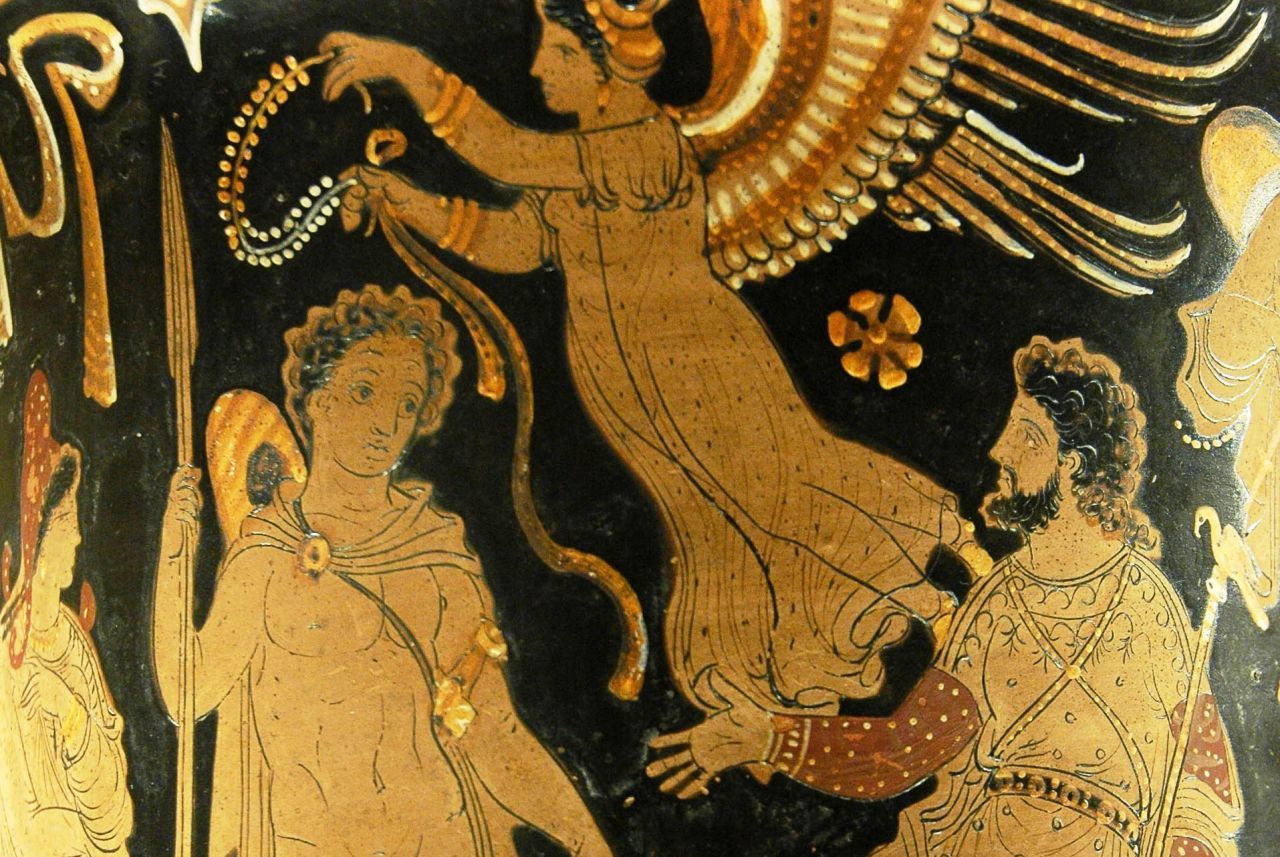
Valerius Flaccus, Argonautica 7. 165 ff :
"That Serpent too, that whole nights long keeps guard and trails his countless circling coils about the grove and, look thou yonder, about the golden fleece--him let her [Medea] enchant with the black venom wherein she trusts, and lure him into slumber from his mighty ash tree."
Valerius Flaccus, Argonautica 7. 515 ff :
"The maiden [Medea] addresses Jason : ‘Hear what perils are yet to come when thou hast quelled the Bulls, and what a warder of the Aeolian [golden] fleece awaits thee; not yet, I avow, have I performed all my promises. There remains yet a direr task, believe me, at the huge tree of Mars [Ares], a task which--ah, would that thou hadst so much faith in me and in Hecate, queen of the night, and in the power we sway!’
She spoke, and that she might show the hero what monsters yet remained, she forthwith roused the Dracon (Dragon) reposing on his innumerable curves and suddenly cast upon him the shadow of the Haemonian prince. The snake, as never before, lifted his head and sent forth vibrant hisses; and when in alarm he had raised himself about the fleece he guarded, while all the tree bristled with his coils, then he began to search and raged through the air with empty jaws.
‘What noise is this? Tell me, O maid, what mean these crashing sounds?’ cries Jason, as chill with alarm he stands and bares his sword. Smiling she draws him aside and putting the snake to silence speaks at length : ‘He is the last of all that my father's anger has in store for thee; alas! unhappy man, once more alas! shalt thou bear the brunt of danger. Ah, would I could see thee without hardship climbing unaided this ash, all rough and dark with interlacing spires, and trampling the very folds of the sleepless monster! Ah! Then might I die!’ So saying she fled."
Valerius Flaccus, Argonautica 8. 54 ff :
"She [Medea] passes with rapid, frenzied steps through the pathless places; he [Jason] clings to her side and pities her as she goes, when suddenly amid the clouds he sees a mighty flame and the darkness quivering with angry gleams of light. ‘Why glows the heaven so, what is that baleful star?’ he asks; and the maiden thus makes answer to his fear: ‘It is the eyes and angry glare of the Dracon (Dragon) himself thou seest; from his crest shoot those quivering flashes, and at me alone doth he gaze in fear, and as of wont of his own accord he summons me, and with fawning tongue asks me for food. Come tell me now, wouldst thou rob him of the fleece while he wakes and can see his foe, or shall I steep his eyes in drowse and so deliver unto thee the serpent subdued?’ The other is silent, such shuddering awe of the maiden has mastered him.
And now the Colchian [Medea] had stretched upward to the stars her hands that bare the wand, and pouring forth spells in barbaric rhythm was calling to thee, O father Somus (Sleep) [Hypnos] : ‘All powerful Somnus, from all the quarters of the world do I the maid of Colchis summon thee and bid thee descend upon the snake alone; oft with thy horn [pouring sleep] have I subdued waves and clouds and lightning brands and all that gleams in heaven; but now, now come to my aid with mightier influence, most like thy brother Letus (Death) [Thanatos]. And thou took faithful warden of Phrixus' beast, it is time at last to turn thy vision away from this duty of thine. What guile dost thou fear while I am beside thee? For a space I will guard the grove myself, meantime lay by thy long toil.’
He brooks not to leave the Aeolian gold [i.e. the Golden Fleece] through weariness nor to surrender his eyes, fain though he be, to permitted slumber; and when the first wafting of drowse assailed him, he shuddered and shook off from his body the beguiling sleep. But on her side the Colchian ceases not to foam with hellish poisons and to sprinkle all the silences of Lethe's (Forgetfulness') bough : exerting her spells she constrains his reluctant eyes, exhausting all her Stygian power of hand and tongue, until sleep gains the mastery over his blazing ire. And now the high crest sinks, now the head is nodding overpowered and the huge neck has slipped from around the fleece it guarded . . .
Medea herself, when she saw the head of her dear Dracon (Dragon) on the ground, darted forward and flinging her arms about him wept alike for her charge and her own cruelty. ‘Not so wert thou when in deep night brining the holy offerings and thy food I saw thee, nor such was I when I placed the honey-cakes in thy open mouth and faithfully fed thee with my potions. In what gross bulk they liest now! How sluggish a breathing holds thy inert frame! Yet a least, hapless one, I slew thee not! Alas! how cruel the daylight thou shalt endure! Soon shalt thou see no fleece, no gleaming offerings in the shadow of thy tree. Give place then, spend thine old age in other groves, forgetting me, I pray; nor let thy deadly hissing chase me from sea to sea. But thou too, son of Aeson [Jason], put by all tarrying, seize the fleece and hie thee. My noxious art has quenched my father's bulls, has laid low the earth-born: lo! There lies the Dracon's body at thy feet, and at last--I hope, at last, I have accomplished all my deadly deeds.’
Then when the hero asked by what way he should climb aloft to the summit of the gold-freighted tree : ‘Courage,’ she cries, ‘go climb the Dracon himself, and set thy footsteps on his back, there in thy path!’ With no delay the child of Cretheus [Jason] trusts her word and scales the ahs tree, high thou it soar, where still the branches guarded the skin of ruddy hue . . . Jason snatches the longed-for prize and the final fruit of toil, and scarce did the tree give up the memorial flight of Phrixus, its yearlong burden, but it uttered a groan and gloomy darkness closed upon it."
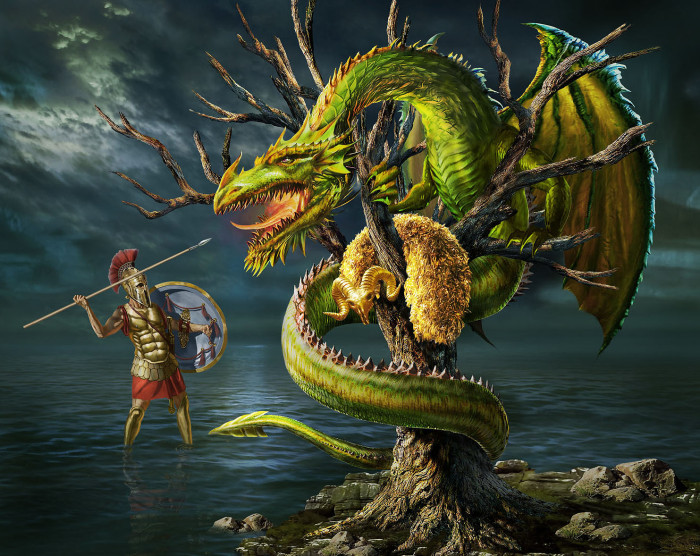
JASON & THE SOWING OF THE DRAGON'S TEETH
One of the tasks Jason had to perform in his quest for the Golden Fleece was to sow the teeth of a Drakon (Dragon) in the field of Ares which birthed a crop of full-grown, armed warriors. The teeth were probably extracted from the Guardian of the Fleece though, according to some accounts, they came from the Drakon which guarded the sacred Grove of Ares near Thebes.
Pseudo-Apollodorus, Bibliotheca 1. 128 - 131 (trans. Aldrich) (Greek mythographer C2nd A.D.) :
"Aeetes ordered him [Iason] to yoke them [metallic bulls created by Hephaistos (Hephaestus)] and sow some drakon-teeth (dragon-teeth) which he had received from Athena : they were half of the teeth which Kadmos (Cadmus) had sown in Thebes . . . And she [Medeia (Medea)] explained to him that when he had sown the drakon-teeth, armed warriors would rise up from the earth to attack him. When he saw them grouped together he was to throw stones in their midst, keeping his distance, and as they were fighting each other over the stones, he was to slay them . . . he sowed the drakon-teeth, and armed men did rise up from the earth. Wherever he saw a quantity of them, he threw stones without their seeing him, and as they fought with each other he moved in and slaughtered them."
Apollonius Rhodius, Argonautica 3. 407 ff (trans. Rieu) (Greek epic C3rd B.C.) :
"[King Aeetes addresses Iason (Jason) :] ‘I propose to test your courage and abilities by setting you a task which, though formidable, is not beyond the strength of my two hands. Grazing on the plain of Ares, I have a pair of bronze-footed and fire-breathing bulls. These I yoke and drive over the hard fallow of the plain, quickly ploughing a four-acre field up to the ridge at either end. Then I sow the furrows, not with corn, but with the teeth of a monstrous serpent, which presently come up in the form of armed men, whom I cut down and kill with my spear as they rise up against me on all sides. It is morning when I yoke my team and by evening I have done my harvesting. That is what I do. If you, sir, can do as well, you may carry off the fleece to your king's palace on the very same day.’"
Apollonius Rhodius, Argonautica 3. 1045 ff :
"[Medea addresses Iason (Jason) :] ‘In the morning, melt this charm, strip, and using it like oil, anoint your body. It will endow you with tremendous strength and boundless confidence . . . neither the spear-points of the earthborn men nor the consuming flames that the savage bulls spew out will find you vulnerable . . .
‘And here is something else that will stand you in good stead. You have yoked the mighty bulls; you have ploughed the stubborn fallow--with those great hands and all that strength it will not take you long--; you have sown the serpent's teeth in the dark earth; and now the giants are springing up along the furrows. Watch till you see a number of them rise from the soil, then, before they see you, throw a great boulder in among them; and they will fall on it like famished dogs and kill one another. That is your moment; plunge into the fray yourself.’"
Apollonius Rhodius, Argonautica 3. 1179 ff :
"The teeth were those of the Aonian [Theban] serpent, the guardian of Ares' spring, which Kadmos (Cadmus) killed in Ogygian Thebes. He had come there in his search for Europa, and there he settled, under the guidance of a heifer picked out for him by Apollon in an oracle. Athene, Lady of Trito, tore the teeth out of the serpent's jaws and divided them between Aeetes and Kadmos, the slayer of the beast. Kadmos sowed them in the Aonian plain and founded an earthborn clan with all who had escaped the spear of Ares when he did his harvesting. Such wee the teeth that Aeetes let them take back to the ship. He gave them willingly, as he was satisfied that Iason (Jason), even if he yoked the bulls, would prove unable to finish of the task."
Apollonius Rhodius, Argonautica 3. 493 ff :
"[Jason addresses his fellow Argonauts :] ‘He [Aeetes] said he had a couple of bronze-footed and fire-breathing bulls grazing on the plain of Ares, and told me to plough a four-acre field with these. He will give me seed from the serpent's jaws which will produce a crop of earthborn men in panoplies of bronze. And I have got to kill them before the day is done.’"
Apollonius Rhodius, Argonautica 3. 1277 ff :
"Iason (Jason), as soon as his men had made the hawsers fast, leapt from the ship and entered the lists with spear and shield. He also took with him a shining bronze helmet full of sharp teeth, and his sword was slung from his shoulder. But his body was bare, so that he looked like Apollon of the golden sword as much as Ares god of war. Glancing round the field, he saw the bronze yoke for the bulls and beside it the plough of indurated steel, all in one piece. He went up to them, planted his heavy spear in the ground by its butt and laid the helmet down, leaning it against the spear. Then he went forward with his shield alone to examine the countless tracks that the bulls had made. And now, from somewhere in the bowels of the earth, from the smoky stronghold where they slept, the pair of bulls appeared, breathing flames of fire. The Argonauts wee terrified at the sight. But Iason planting his feet apart stood to receive them, as a reef in the sea confronts the tossing billows in a gale. He held his shield in front of him, and the two bulls, bellowing loudly, charged and butted it with their strong horns. But he was not shifted from his stance, not by so much as an inch. The bulls snorted and spurted from their mouths devouring flames, like a perforated crucible when the leather bellows of the smith, sometimes ceasing, sometimes blowing hard, have made a blaze and the fire leaps up from the bellow with a terrific roar. The deadly heat assailed him on all sides with the force of lightning. But he was protected by Medea's magic. Seizing the right-hand bull by the tip of its horn, he dragged it with all his might towards the yoke, and then brought it down on its knees with a sudden kick on its bronze foot. The other charged, and was felled in the same way at a single blow; and Iason, who had cast his shield aside stood with his feet apart, and though the flames at once enveloped him, held them both down on their fore-knees where they fell. Aeetes marvelled at the man's strength.
Kastor (Castor) and Polydeukes (Polydeuces) picked up the yoke and gave it to Iason--they had been detailed for the task and were close at hand. Iason bound it tight on the bulls' necks, lifted the bronze pole between them and fastened it to the yoke by its pointed end, while the Twins backed out of the heat and returned to the ship. Then, taking his shield from the ground he slung it on his back, picked up the heavy helmet full of teeth and grasped his unconquerable spear, with which, like some ploughman using his Pelasgian goad, he pricked the bulls under their flanks and with a firm grip on its well-made handle guided the adamantine plough.
At first the bulls in their high fury spurted flames of fire. Their breath came out with a roar like that of the blustering wind that causes frightened mariners to take in sail. But presently, admonished by the spear, they went ahead, and the rough fallow cleft by their own and the great ploughman's might lay broken up behind them. The huge clods as they were torn away along the furrow groaned aloud; and Iason came behind, planting his feet down firmly on the field. As he ploughed he sowed the teeth, casting them far from himself with many a backward glance lest a deadly crop of earthborn men should catch him unawares. And the bulls, thrusting their bronze hoofs into the earth, toiled on till only a third of the passing day was left. Then, when weary labourers in other fields were hoping it would soon be time to free their oxen from the yoke, this indefatigable ploughman's work was done - the whole four-acre field was ploughed.
Iason freed his bulls from the plough and shooed them off. They fled across the plain; and he, seeing that no earthborn men had yet appeared in the furrows, seized the occasion to go back to the ship, where his comrades gathered round him with heartening words. He dipped his helmet in the flowing river and with its water quenched his thirst, then flexed his knees to keep them supple; and as fresh courage filled his heart, he lashed himself into a fury . . .
By now the earthborn men [Spartoi] were shooting up like corn in all parts of the field. The deadly War-god's [Ares'] sacred plot bristled with stout shields, double-pointed spears, and glittering helmets. The splendour of it flashed through the air above and struck Olympos. Indeed this army springing from the earth shone out like the full congregation of the stars piercing the darkness of a murky night, when snow lies deep and the winds have chased the wintry clouds away. But Iason did not forget the counsel he had had from Medea of the many wiles. He picked up from the field a huge round boulder, a formidable quoit that Ares might have thrown, but four strong men together could not have budged from its place. Rushing forward with this in his hands he hurled it far away among the earthborn men, then crouched behind his shield, unseen and full of confidence. The Kolkhians (Colchians) gave a mighty shout like the roar of the sea beating on jagged rocks; and the king [Aeetes] himself was astounded as he saw the great quoit hurtle through the air. But the earthborn men, like nimble hounds, leapt on one another and with loud yells began to slay. Beneath each other's spears they fell on their mother earth, as pines or oaks are blown down by a gale. And now, like a bright meteor that leaps from heaven and leaves a fiery trail behind it, portentious to all those who see it flash across the night, [Iason] the son of Aeson hurled himself on them with his sword unsheathed and in promiscuous slaughter mowed them down, striking as he could, for many of them had but half emerged and showed their flanks and bellies only, some had their shoulders clear, some had just stood up, and others were afoot already and rushing into battle. So might some farmer threatened by a frontier war snatch up a newly sharpened sickle and, lest the enemy should reap his fields before him, hasten to cut down the unripe corn, not waiting for the season and the sun to ripen it. Thus Iason cut his crop of earthborn men. Blood filled the furrows as water fills the conduits of a spring. And still they fell, some on their faces biting the rough clods, some on their backs, and others on their hands and sides, looking like monsters from the sea. Many were struck before they could lift up their feet, and rested there with the death-dew on their brows, each trailing on the earth so much of him as had come up into the light of day. They lay like saplings in an orchard bowed to the ground when Zeus has sent torrential rain and snapped them at the foot . . . Such was the scene that King Aeetes now surveyed, and such his bitterness."
Pseudo-Hyginus, Fabulae 22 (trans. Grant) (Roman mythographer C2nd A.D.) :
"Aeetes appointed this task to Jason, if he wished to take away the golden fleece--to yoke with yoke of adamant the bronze-footed bulls which breathed flames from their nostrils, and plow, and sow from a helmet the dragon's teeth, from which a tribe of armed men should arise and slay each other . . . When he had plowed with bulls, and the armed men had been born, by Medea's advice he threw a stone among them. They then fought among themselves and slew each other."
Valerius Flaccus, Argonautica 7. 62 ff (trans. Mozley) (Roman epic C1st A.D.) :
"[King Aeetes addresses Jason and the Argonauts :] ‘Before the city there lies the plain of Mars [Ares], rough with neglect through many years, and fiery bulls there are, slow sometimes to recognise me when the ploughshare bites the ground. These more and more have my increasing years now suffered to grow wild and unruly, and a prouder flame than of wont shoots from their bellowing mouths. Succeed then, valiant stranger, to my renown, and till my fields once more. The seed which once I sowed will not be lacking, nor the harvest which once I encountered alone . . . I know not yet whether I would have thee straightway enwrapped in flame and darkness, or rather see thee endure a while till the plain be upturned and the seeds sown and warriors come forth from the teeth of Cadmus' snake and the fallows flower with armed men.’"
Valerius Flaccus, Argonautica 7. 610 ff :
"Then, as though it were the Libyan plain or the fertile plough-lands of rich Nile that he [Jason] were cleaving [with the fire-breathing bulls], he joyfully scatters the seeds by handfuls on the ground and burdens the newly-tilled land with war. Then thrice from the very ploughshare issued the trump of Mars [Ares] and from every furrow blared the horns; then was the warlike soil shaken, and the phalanx took life and arms together, and sprang up over all the plain. The hero withdrew and betook himself for a space to his companions, waiting till the earth should show him the first troop. But when he saw the furrows at last open before the summits of the crests, and the surface quivering with the helmet-peaks, he darted upon them, and where the earth lay closest to the base of their necks, nor yet had their shoulders seen the light, quick to work with obedient sword he levels the trunks with the ground; and as they follow, gleaming corselet or hands first rising from their mother doth he attack and lays them low ere they can strike. Yet suffices he not for the thousands who on this side and on that are springing up . . . Once more then he has recourse to the Colchian's [Medea's] friendly arts, and disjoins the chain and fastening at his helmet's base; yet he hesitates and would fain himself to challenge the whole array; but no hope offers, so closely throng the banners of the Earth-born on every side, so loud their shouts and trumpet calls. And now all caught sight of the man, and at once all weapons are flying at him. Then mad with fear in such peril he flung into their midst the helmet which Medea of late had drugged with hellish poison: straightway the spears were turned about. And just as the anger of the mournful Mother [Rhea-Kybele (Cybele)] rends every year the frenzied Phyrgians, or as Bellona [Enyo-Ma] lacerates the long-haired eunuchs, so doth Medea suddenly inflame and embroil the cohorts, and drive the doomed brethren to battle with their kin. Each one thinks that it is Jason he is laying low, all alike are fired with similar rage. Aeetes stands aghast and would fain recall the madmen, but all the host was on the ground, nor was nay first to fall or last to remain, but the earth of a sudden swallowed up all her dead."
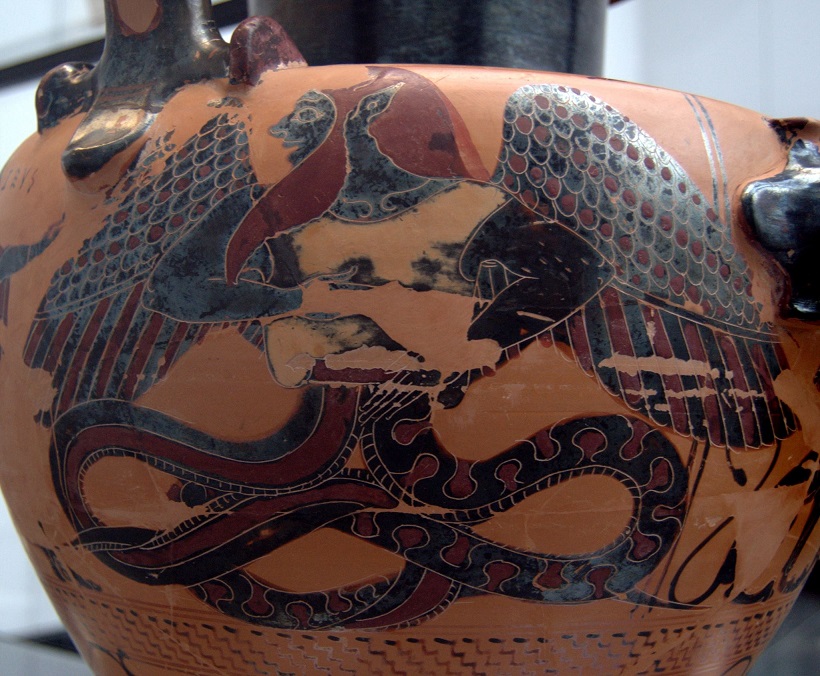
Sources
GREEK
Pindar, Odes - Greek Lyric C5th B.C.
Apollodorus, The Library - Greek Mythography C2nd A.D.
Apollonius Rhodius, The Argonautica - Greek Epic C3rd B.C.
Lycophron, Alexandra - Greek Poetry C3rd B.C.
Diodorus Siculus, The Library of History - Greek History C1st B.C.
Philostratus the Elder, Imagines - Greek Rhetoric C3rd A.D.
Philostratus the Younger, Imagines - Greek Rhetoric C3rd A.D.
ROMAN
Hyginus, Fabulae - Latin Mythography C2nd A.D.
Ovid, Metamorphoses - Latin Epic C1st B.C. - C1st A.D.
Ovid, Heroides - Latin Poetry C1st B.C. - C1st A.D.
Propertius, Elegies - Latin Elegy C1st B.C.
Seneca, Medea - Latin Tragedy C1st A.D.
Valerius Flaccus, The Argonautica - Latin Epic C1st A.D.
Morford, Mark; Robert Lenardon (2003). Classical Mythology (7 ed.). New York: Oxford University Press. p. 581.
"Theoi"
Our Mobile Application
Check out Our Mobile Application "Ancient Greece Reloaded"


